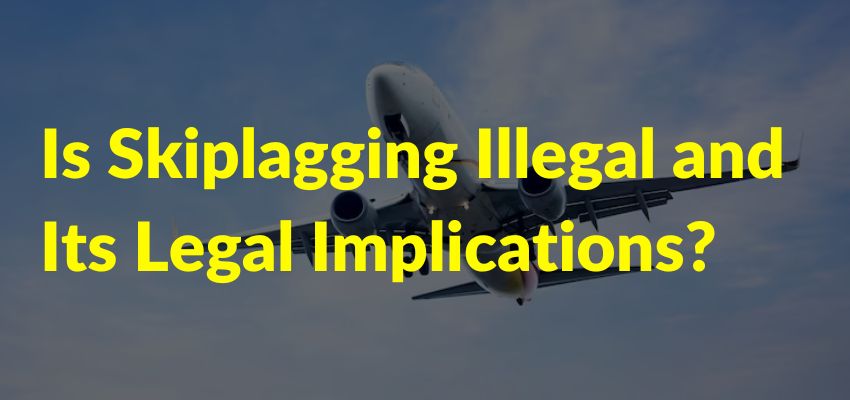Skiplagging, a term you might have heard if you're a savvy traveler, refers to the practice of booking a flight with the intention of getting off at a layover point instead of your final destination. This travel hack can save you money, but how does skiplagging cost airlines money and Is Skiplagging illegal? In this blog, we'll explore the legal and ethical aspects.
Understanding Skiplagging
Let's first examine skiplagging's legality before learning how it operates. Consider that the direct trip from New York to Los Angeles is costly. Instead, a flight with a layover in Los Angeles from New York to San Francisco is shown to be less expensive. You reserve a flight from New York to San Francisco and just disembark in Los Angeles, avoiding the final leg of the trip. Although it's a brilliant approach to cut costs, is it legal?
Hidden City Ticketing
Because skiplagging effectively involves utilizing a layover city as your intended destination, it is also known as "hidden city ticketing." Some airlines, especially the bigger ones, don't like this practice and might punish you if they find out.
Is Skiplagging Illegal?
Skiplagging exists in a legal gray area, and the answer largely depends on the airline's terms and conditions. Here's what you need to know:
Contract of Carriage
When you reserve a flight, you and the airline enter into a legal agreement called the "Contract of Carriage." The guidelines and requirements you must abide by are set forth in this contract. Some airlines have the right to take action against customers who engage in skiplagging because it is expressly forbidden in their terms and conditions.
Risk of Losing Benefits
If you're a frequent flyer with elite status or you've accrued miles with an airline, skiplagging could jeopardize your loyalty program status. Airlines may revoke your benefits, miles, or status if they discover you've been using this strategy.
Cancellation of Return Flights
Using skiplagging on the outbound journey can also impact your return trip. Airlines often cancel the remaining segments of your itinerary if you miss a leg of your flight. So, if you're planning a round-trip, this is something to consider.
Why is Skiplagging Illegal?
Skiplagging is not inherently illegal in the sense that it is a criminal offense, but it can be considered a breach of contract with the airline. Here are the key reasons why skiplagging can be problematic and may lead to consequences:
Contractual Agreement
When you purchase an airline ticket, you enter into a contractual agreement with the airline. This agreement includes terms and conditions that you agree to follow when you use their services. Skiplagging violates these terms, which can result in actions taken by the airline.
Risk to the Airlines
Airlines plan their flights, seat assignments, and baggage handling based on passengers' intended destinations. When passengers skip a leg of their flight, it can disrupt these plans, potentially causing delays, complications, and additional costs for the airline.
Impact on Overbooking
Skiplagging might make overbooking problems worse. Airlines may overbook flights in anticipation that some passengers won't finish their journeys, which could cause hardship for other passengers, if travelers regularly miss their final destinations.
Loss of Revenue
Airlines operate on tight profit margins, and skiplagging can lead to revenue losses. While it's true that some airline pricing structures are complex, intentionally exploiting these pricing anomalies may be seen as unfair to the industry.
Is Skiplagging Ethical?
Apart from the legal perspective, there are ethical aspects to consider when it comes to skiplagging:
Overbooking Issues
Skiplagging can sometimes contribute to overbooking issues for airlines. When passengers skip their final leg, it can create problems with aircraft weight distribution and cabin occupancy, potentially causing delays and affecting other passengers.
Impact on Airlines
Skiplagging might result in financial losses because airlines have limited profit margins. While some may contend that airlines overcharge for tickets, it may be considered unfair to the industry to take advantage of these pricing policies on purpose.
Passenger Solidarity
In an era where passengers are advocating for their rights and fair treatment, some argue that skiplagging is contrary to the principles of solidarity among travelers. If everyone started skiplagging, it could harm the overall airline experience.
What are the Tips for Safe Skiplagging?
If you decide to try skiplagging despite the potential legal and ethical concerns, here are some tips to minimize the risks:
Read the Fine Print: Carefully review the terms and conditions of the airline you're booking with. Some airlines are more lenient than others.
One-Way Tickets: Consider booking one-way tickets to your desired layover city instead of a round-trip. This minimizes the risk of having your return flight canceled.
No Checked Baggage: Avoid checking baggage if possible, as it might be routed to the final destination without you.
Book Directly: Booking directly with the airline rather than through third-party sites can make it easier to deal with any issues that may arise.
Be Discreet: Keep a low profile when using this strategy. Don't openly discuss your plan with airline staff or fellow passengers.
Conclusion
This is a cost-cutting technique that has some applications in the realm of travel. It's crucial to understand the ethical and legal ramifications of this practice, though. Although skiplagging is not specifically prohibited, it may have negative effects including losing loyalty benefits or running into trouble with airlines. If you decide to employ this tactic, proceed with prudence, be aware of the hazards, and think about the moral implications for the sector and other travelers. In the end, your personal travel objectives and values will determine whether skiplagging is the correct choice for you.





0 Comments